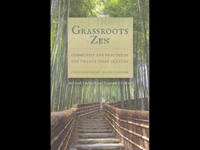Zen Buddhism
Zen is often referred to as the heart of Buddhism and its enigmatic teachings have fascinated spiritual seekers for centuries. Although Zen emphasizes that its teachings lie beyond words, many Zen masters have written books which eloquently point to a deep intuitive understanding of reality.
Zen Buddhism
D.T. Suzuki
Anchor Books (1956)
The volume contains selected writings of D.T. Suzuki, one of the primary exponents of Zen in English. The book is intended to introduce the general reader to the history and spirit of Zen.
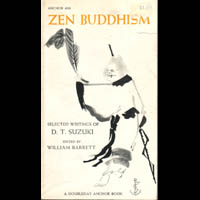
The Way of
Zen
Alan Watts
Vintage Books (1957)
For many Westerners The Way of Zen by writer Alan Watts was their first introduction to the teachings of Zen Buddhism. In his lucid readable style, Watts discusses the background, history, principles and practices of this powerful Eastern spiritual teaching.
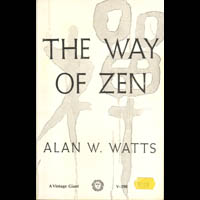
Essays in
Zen Budhism
D.T. Suzuki
Grove Press (1961)
In this collection of his most important essays, D.T. Suzuki explores a variety of topics, including the history of Buddhism, the daily life of a Zen monk, and the path to enlightenment.
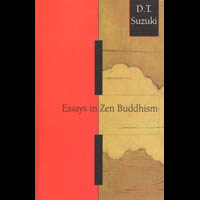
Zen in the
Art of Archery
Eugen Herrigel
Vintage Books (1971)
In this classic volume, Herrigel, a German philosopher who came to Japan and took up the practice of archery as a means of understanding Zen, gives an illuminating account of his experience under the tutelage of a Zen master.
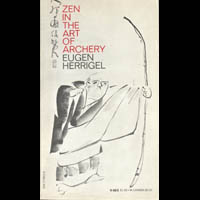
Zen Mind,
Beginner's Mind
Shunryu Suzuki
Weatherhill (1973)
This masterly book originated from a series of talks given by Zen master Suzuki to his Western students. His approach is informal, and he draws his examples from ordinary events and common sense. Highly recommended.
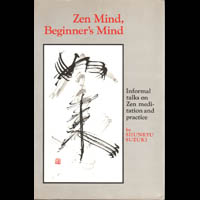
Dropping Ashes
on the Buddha
Seung Sahn
Grove Press (1976)
The book consists of dialogues, stories, Dharma talks and letters, reflecting Korean Zen master Seung Sahn's interactions with his Western students. This fresh presentation of Zen teaching is irreverent and often hilariously funny.
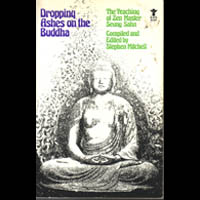
Zen Dawn in
the West
Philip Kapleau
Anchor Press (1979)
The volume draws upon Zen Roshi Kapleau's experience in conducting intensive meditation retreats, introductory workshops and lectures to provide a comprehensive overview of Zen teachings for a Western audience.
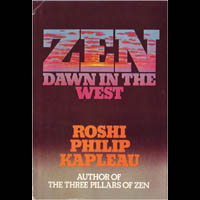
Taking the
Path of Zen
Robert Aitken
North Point Press (1982)
American Zen teacher Robert Aitken has written a comprehensive introduction to Zen with an emphasis on zazen or meditation practice. Aitken discusses correct breathing, meditation posture, teacher-student relations and the difficulties encountered on the path of spiritual awakening.
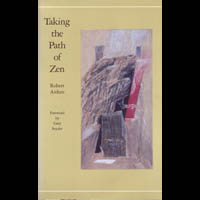
Zen: Tradition
and Transition
Kenneth Kraft, ed.
Grove Press (1988)
Professor Kraft has compiled an important collection of essays reflecting the work of both Zen teachers and Zen scholars. Topics include Zen history, poetry, meditation, encounters with Zen masters, and recent developments in North American Zen.
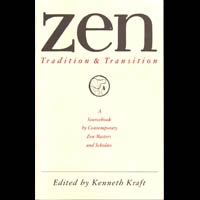
Everyday Zen
Charlotte Joko Beck
Harper (1989)
Charlotte Beck is a contemporary American Zen teacher who offers a warm engaging approach to using Zen to deal with the problems of everyday living -- love, relationships, work and suffering. Learning to live in the present moment is the essence of her teaching.

The Three
Pillars of Zen
Philip Kapleau
Anchor Books (1989)
Roshi Kapleau's influential book artfully presents the three foundations of Zen: theory, practice and enlightenment. The text blends lectures, meditation instruction, the personal experiences of students, and commentaries on Zen teachings to instruct and inspire the spiritual seeker.
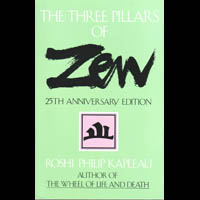
Zen Essence
Thomas Cleary
Shambhala (1989)
This collection of the teachings of great Chinese Zen masters shows that Zen is practical, remarkably flexible, adaptive to contemporary and individual needs, and able to transcend cultural boundaries.
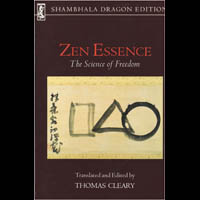
The Work of
This Moment
Toni Packer
Shambhala (1990)
Former Zen teacher Toni Packer presents a radically simple and original approach to spiritual growth free from religious authority and dogmatism in this collection of talks, essays, interviews and letters.
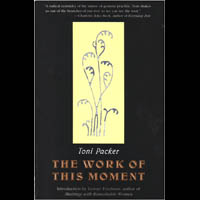
Nothing Special:
Living Zen
Charlotte Joko Beck
Harper (1993)
This companion volume to Everyday Zen focuses on the importanc of everyday life as an opportunity for spiritual growth and awakening. Beck writes with wit, penetrating insight and compassion.
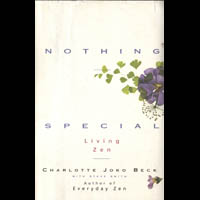
Essential
Zen
Kazuaki Tanahashi & Tensho David Schneider, eds.
Castle Books (1994)
Essential Zen is a collection of classic Zen writings and works by contemporary Zen exponents. The stories, poems and teachings reflect the universal appeal of Zen as a path of spiritual awakening.
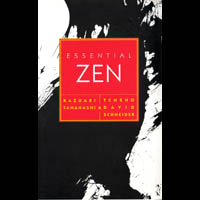
Awakening
to Zen
Philip Kapleau
Scribner (1997)
The volume is a compilation of Roshi Kapleau's writings, talks, lectures and interviews spanning a 32 year period. Kapleau's practical grounded approach to Zen teachings is especially accessible to the Western mind.
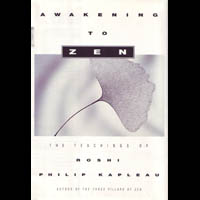
The Compass
of Zen
Seung Sahn
Shambhala (1997)
Zen master Seung Sahn's clear presentation of essential Buddhist teachings is direct and often humorous. He cuts to the heart of Buddhism without relying on esoteric or academic langauge in a way that is accessible for both beginners and long-time students.
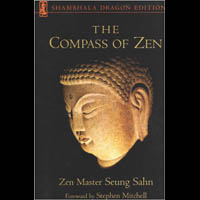
To Know Yourself
Albert Low
Charles E. Tuttle (1997)
Zen teacher Albert Low studied with Roshi Philip Kapleau for more than 20 years. The book is an engaging collection of talks, stories and articles on Zen ranging from Dharma talks to discussions on Buddhism and Christianity.
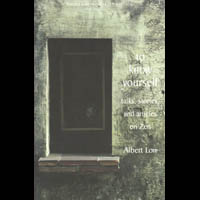
Teachings
of Zen
Thomas Cleary
Shambhala (1998)
In this anthology, renowned Buddhist translator Thomas Cleary presents talks, sayings and records of encounters between teachers and students to show the essence of Zen through the words of Zen masters themselves.
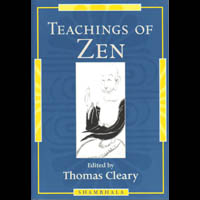
The Light Inside
the Dark
John Tarrant
Harper Perennial (1999)
Australian Zen teacher, poet and psychotherapist John Tarrant weaves personal reminiscences and tales from Eastern and Western spiritual traditions to map the soul’s journey from ignorance to enlightenment. His lyrical writing captures the light and darkness of the human condition with warmth, humour and boundless optimism.
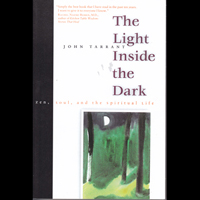
Zen Is Right
Here
Shunryu Suzuki
Shambhala (2001)
Students of Zen master Shunryu Suzuki offer personal stories and anecdotes of their teacher which capture the essence of his teaching style -- humorous, paradoxical and enlightening.
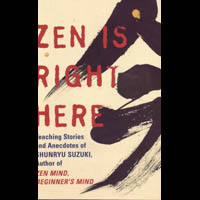
The Wonder
of Presence
Toni Packer
Shambhala (2002)
This meditative inquiry challenges our beliefs and assumptions about the nature of enlightenment. The reader is brought back to the ground of their own experience and invited to a genuine investigation of the wonder of choiceless awareness and timeless presence.
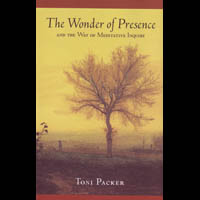
The Art of
Just Sitting
John Daido Loori
Wisdom Publications (2004)
One of the simplest yet most effective methods of meditation is “just sitting.” In Zen this subtle approach is called shikantazi. Zen abbot John Daido Loori brings together writings ranging from classical Zen masters to contemporary teachers to point directly to the essence of this powerful spiritual practice.
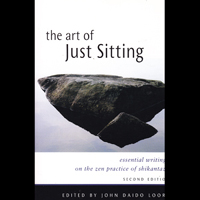
The Path of
the Human Being
Dennis Genpo Merzel
Shambhala (2005)
The book offers a clear and accessible perspective on Zen practice and its relevancy to the demands of the modern world. Both beginners and seasoned practitioners on the spiritual path can benefit from the experience and insights of this contemporary American Zen teacher.
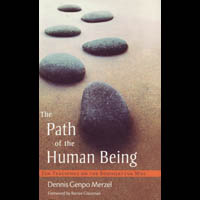
Upside-Down
Zen
Susan Murphy
Wisdom Publications (2006)
Writer, filmmaker and spiritual teacher Susan Murphy expresses the timeless wisdom of the Zen tradition in modern, lyrical terms. She draws from such diverse sources as literature, folktales, modern cinema and Australian aboriginal spirituality.
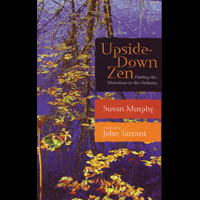
The Silent
Question
Toni Packer
Shambhala (2007)
In simple, clear and direct language spiritual teacher Toni Packer presents the essence of mindfulness practice and awareness meditation. She provides insights on using the experiences of life to reach a state of inner stillness beyond thoughts and words.
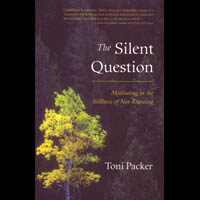
The Method
of No-Method
Sheng Yen
Shambhala (2008)
Chinese Chan master Sheng Yen describes the practice of silent illumination in which the practitioner puts aside all thoughts except the awareness of oneself “just sitting.” This seemingly simple practice is subtle and profound as it slowly reveals our true nature and leads to a perception of the “vast ocean of pure awareness.”
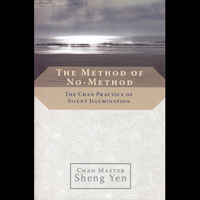
Nothing Holy
About It
Tim Burkett
Shambhala (2016)
Psychologist and Zen teacher Tim Burkett was a student of respected Zen master Shunryu Suzuki, and later of Dianen Katajiri Roshi, in whose lineage he is a dharma heir. His deep respect and admiration for his teachers is evident in the many personal anecdotes about both that appear throughout the book. His primary message reflects the book’s title: one doesn’t need to look for holiness since buddha nature is right here in front of us in the experiences of everyday life.
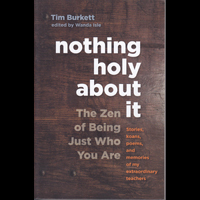
The Spirit
of Zen
Solala Towler
Watkins (2017)
The Spirit of Zen is a compilation of stories, history and practical guidance from classical and contemporary Zen masters. The stories are profound, earthy, outrageous and full of paradox, as well as highly entertaining. The text is accompanied by beautiful black and white photographs of the natural world that capture the spirit of Zen.
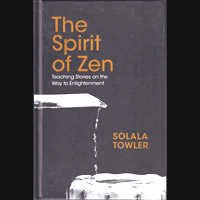
Grassroots
Zen
Perle Besserman and Manfred Steger
Monkfish Books Publishing (2017)
The authors present a socially engaged form of Buddhism which integrates meditation and traditional Zen practices with work, family, and social obligations. Their grassroots approach emphasizes individual responsibility and offers a vision of an egalitarian spiritual community suitable for the modern world.
